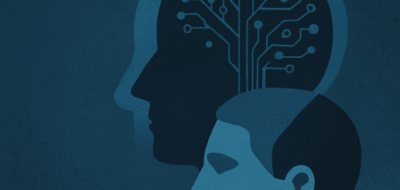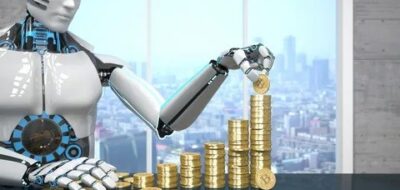A vital criterion for assessing data management efficiency in enterprises is ease of use. Great user experience is a priority, not the whim of a spoiled customer. Data processing in a company should resemble driving a car: fast, safe and comfortable. Today’s consumers look for both instant results and comfort. Business managers should seek the same. There must be no gap dividing consumer electronics into smartphones, car navigation devices and tablets on the one hand and professional workplace applications on the other. The competition for good employees will be won by those who realize the importance of comfort and convenience for the users of systems and devices. W
Everyone creates an app
Simple solutions can produce interesting scenarios. While browsing the web, almost everyone encounters ads for website builders that help us – simple users – design basic websites. It is not a stretch to conceive lay people having access to easy-to-use tools for easily applications. Today’s start-ups are developing solutions that will enable web users to distinguish real information from false. Future users will be able to build – all by themselves – applications that will help them in the process, by putting together just a few of building blocks. Soon, devices that make our lives easier in business and the office will no longer require IT expertise to produce. We will create them ourselves. The building of business applications may soon resemble playing with Lego blocks – we ourselves will define the purpose of the device and how it is going to work. Perhaps such smart toys for professionals will be indispensible to come to grips with the reality that overwhelms us with a constant barrage of new content.

Understanding the information market
User experience is applications. Apps are data. And the data is for sale. Data is bound to be monetized at an ever-faster rate. The push to commercialize data began around 2000 with the bursting of the so-called dotcom bubble. The internet-based companies that survived launched a search for new income streams. This gave birth to the idea of creating demand for a whole new product: data. The idea caught on in the marketing community, which badly needed data to identify customer behaviors and profiles. In fact, everyone needs data today, which is why the companies that offer tools for instant information sorting and retrieval have an interesting future ahead of them. The buying of off-the-shelf algorithms by big business may become a trend, leading in time to the emergence of new technology industries. Against this background, it is difficult to disagree with Hal Varian, Google’s chief economist, who claims that piling data on top of data will not, in itself, add to its value. Instead, value will be gained by the intelligence that goes into designing the algorithms that make sense of it all. Google’s success, he says, “is about recipes, not ingredients.” Instead, value will be gained by the intelligence that goes into designing data filtering, sorting and organizing algorithms. The future of the data market lies in the information obtained from sensors placed on public transport and in public places, where all of us leave “traces” of our presence, and produce mountains of data in social media and online stores. It is in these areas that the BIG DATA game will continue to play out. Algorithm makers should watch this closely as this is where the most valuable “resource”: knowledge about today’s customers, will be found. Will future algorithms “convert” data streams from all these diverse sources to make them appealing to corporate buyers? Only time will tell.
It is the data that will drive and fuel the applications or neural networks, but the user experience will decide whether customers will buy data-based services. The winner will be the supplier whose process will be more responsive to the client’s needs or will redefine or recreate the client’s needs.
The coming algorithm reckoning
By inviting artificial intelligence into our world, we will create many jobs for lawyers. Undoubtedly, a battle will break out between social media owners, insurers and regular citizens. Each of these groups see data and information protection rights in a completely different light, and data has become a very sensitive and controversial commodity. Ever more regulators are aware of just how sensitive it is as they attempt to design laws (such as the EU’s General Data Protection Act that goes into effect May 25) to regulate data trading.
Regulation is not going to be easy. “Machine learning,” for example, is automated to perfects itself as it acquires experience; the more search queries an artificial intelligence processes, the better its responses. The question therefore is whether the algorithms that use this technology will be able to protect our data from undesirable use. While technologically feasible, every business with an interest in acquiring and using as much data as it can get its hands on will see the question from a very different perspective.

Data for everyone, and the dangers
For many years, data was “owned” by IT departments. Although business analysts and managers used it to make business decisions, IT people were responsible for collecting, storing and sharing it. Recently, with organizations needing to move agilely, and make data-driven decisions, it has become obvious that more business users need independent access to it, without IT. This has introduced the concept of data democratization, i.e. data for everyone. Everyone becomes both a creator and user of data. This approach may create a more level playing field for fair market competition and create new business models. The way I see it, data democratization can trigger significant changes in organizations that embrace it correctly, allowing users to quickly generate business models or create new customized products and services. Of course, this formula is fraught with some threats, such as those related to data security.
The need for data security is obvious, even clichéd. Personal and business data is valuable prey for hackers and unfair competitors. Therefore, a big challenge for today’s technology industry is to create systems that ensure a high level of security. In my previous articles, I have highlighted the benefits of blockchain technology. Its inherent security results from a design that relies on cryptography. It can therefore live up to our expectations regarding tool and system reliability. In a nutshell, to crack blockchain, one needs computational power equal to an estimated half of the internet. (Still, with the advent of quantum computers, new cryptographic safeguards are becoming necessary.)
Blockchain will benefit hospitals, banks, insurance companies and governmental agencies as well as any other organizations whose job is to protect the confidentiality and data of their clients and/or businesses against theft or counterfeiting. According to estimates, blockchain may become commonplace by 2025.
World without end
To describe the transformation of the data and information sector, analysts have come up with the concept of the “data network effect,” in which corporations constantly churn out new data sets to attract customers while customers use the devices and tools provided by corporations to generate even more data. This underlies the continuous improvement of intelligent devices, programs and applications. Technology today knows no borders, and its ubiquity is driving growth in the data and information sectors. Is it therefore an exaggeration to say that “everything is information”? I don’t think so.
A change unfolding in today’s world of data is that of extensive personalization. Contemporary data sets are human-oriented. They are no longer strings of characters forming a code that only an IT expert can understand. Today, data are our faces (which computers can now recognize) and our voices (which we use to run applications). It is the information saved in onboard automobile computers and by the websites we visit. Combined with data about our income, places of residence and gender. this makes up an information universe, with all of us a central star, brightly generating ever more data.
This universe is a space where the human meets the machine. These evolving encounters will be a never-ending adventure, with both promises and dangers, some even now beyond our imagination.

Data have our eyes
A breakthrough unfolding in today’s world of data is one of extensive personalization. Contemporary data sets are very much human-oriented. They are no longer strings of characters forming a code that only an IT expert can understand. Today, data make up people’s faces in photographs, which computers can now recognize, and our voices, which we use to run applications. It is also the information saved in onboard automobile computers and by the websites we visit. All of this, combined with data about our income, places of residence and gender, makes up an information universe, of which we are a central part. It is for that universe and specifically, for the benefits it can provide, that a battle is waging. Benefits for everyone and the user’s ease of access and user experience in the process of interaction with the machine. The universe has become a place where people meet machines. By all indications, the encounter will become a never-ending adventure, with only some of its scenarios being imaginable today.
Related articles:
– Automation will not destroy all jobs
– Blockchain poised to shake up our lives
– Will quantum computers doom the blockchain?
– Artificial intelligence is a new electricity
– A machine will not hug you … but it may listen and offer advice










Adam
Nicely written. Refreshing to read that at least there are others willing to write as they see it and not follow popular/sanctioned narratives.
Zoeba Jones
In my opinion, the greatest threat from giving out too much data is that at some later date you might be targeted by someone with an agenda. Some entity they’ve never even thought of, be it a government, criminals, a corporation, or something completely unforeseen can someday use the innocuous information everyone broadcasts to model your personality and affiliations, and then they can use that information to your detriment. The motivations an entity might have to do so are endless. But most people are stubbornly unwilling to consider the possibility that the freedoms and rights and privileges they enjoy might not always be there. I talk about how governments almost everywhere are becoming more authoritarian and more powerful, and I get called paranoid. No one wants to make even the slightest sacrifice because the possible futures I warn them about are barely imaginable, totally implausible to them. But their intuition means nothing, because their data will be there forever, and a lot can change in a few decades in ways nobody can predict. People have an availability heuristic bias that they just can not get over.
JackC
In 2020, there is going to be a lot of momentum behind three new types of machines: one that scans with the directx chip, one that provides a voice-recognition system that we already use on phones, and one that allows you to interact with your phone using your voice. These all seem extremely interesting, and I think the first new device we should explore is one that lets you see what you’re seeing in your phone, like Google Glass.
And then there will be some interesting new energy technologies to experiment with, including something that uses charging to deliver power to devices.
Mac McFisher
Like the title says, what are your predictions for the next five years in artificial intelligence? I have a few in mind.
Autonomous vehicles. I don’t think fully driverless cars will be legal yet, but I think more and more parts will become driverless in more vehicles. For example, maybe automatic braking at red lights, more sophisticated automatic collision avoidance, and maybe even auto parking in a parking lot. Baby steps.
Image manipulation will become more ubiquitous in apps. FaceApp was just the beginning.
5G is going to be rolled out in the next few years. Among other things it will make live streaming video very easy. Any image processing which might be done on a server may apply live machine learning-driven video enhancements, for example.
Adam Spikey
Great stuff Norbert Biedrzycki! Can not agree more.
TomHarber
Data !!!
JohnE3
Great article. Thank you
TommyG
Imagine that you have all the tweets on a bank’s customer care page in Twitter. If you can somehow analyse these tweets and find out where are the customers facing an issue, and to what degree, will that be useful? Can banks leverage this insight to improve their services?
Karel Doomm2
Data
Jack666
Nice
Oscar2
User. Always. Data cames from them
Acula
In the expanding world of the Internet of Things, entrepreneurs would be better off to remember two old adages: Resistance is futile, and if you can’t beat them join them. No matter its predicted benefit, the notion of change is hard to accept because people are settled into comfort zones and face resistance based on the status quo. Profiting from your information might be the best selling point. After all, everyone else will benefit from your data. Why not you?
Tom299
Good read
TonyHor
Hi Norbert. Great stuff. Love your articles 🙂
Jacek B2
Catchy title. Always data
Mac McFisher
We will see more and more deepfakes. The research in GAN architectures is still booming and with very good results.
Autonomous driving, even if not legal, will also boom in research, specially the computer vision side of it (And by extension the actual control the car).
We are also seeing some interest in other types of data (I think it was Facebook that released a paper using deep to resolve mathematical equations), which can open doors to new types of applications in Deep. This is, for me, the most interesting of all as it is an approach that is sometimes forgotten.
Also from the mathematical side there are some papers trying to give us lower/upper bounds to a given architecture (which could lead to more confidence in a given network in a mathematical sense).
Also quantum computing allied with machine learning is making its first steps with some cute papers and algorithms.